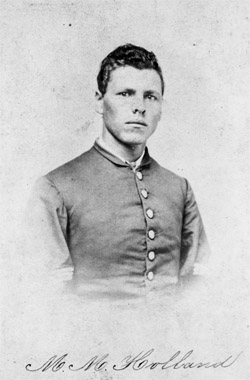By Dr. Brian Schoen, Associate Professor of History
on the dedication of the Milton Holland historical marker
Throughout our nation’s history, we have debated the role of the federal government in creating or enhancing freedom and creating what we commonly refer to as an American Dream. Milton Holland’s life, his dreams, and our commemoration of them, reminds us of the often narrow door to access that American dream, and it brings us to a time when the nation generally seen as underwriting that dream seemed in peril.
Related Story: Legacy of Milton Holland remembered with historical marker dedication
Born a slave and freed under uncertain circumstances prior to the war, Holland offered his services to the United States, to a government that just months earlier due to his race had refused to accept his willingness to fight and would only afterward offer him any rights as a citizen. Yet for Holland the Civil War provided the opportunity for what Lincoln would claim (almost exactly 150 years ago) to be a “new birth of freedom” for him personally, for his brethren, and for the nation.
Historians are fond, for good reason, of debating the motives of Civil War soldiers—highlighting a variety of possibilities: money, fame, ideology, peer pressure. In the limited wartime written record that Holland left, he provides some insights of his motives. A January 1864 letter indicates that despite the lower then average wages, Holland risked his life for “the freedom of our brothers in bondage” and the “defense of our national color, the Stars and Stripes.” Unlike most of his white counterparts, Holland’s armed role in the war began as an effort not just to defend the nation but to end slavery. In an act of personal patriotism and sacrifice extraordinary in the annals of history, he and some 200,000 African-American soldiers donned the Union blues in hopes of ushering in transformative change and eventually pushing the nation closer toward the ideals that it had professed at its founding: freedom and equality of opportunity.
Though never completely successful in changing the racially hardened hearts of the dominant white society, North and South, Holland’s actions, and that of his compatriots, made a difference. Their willingness to rise to the occasion, even before white generals and the Lincoln administration were willing to call upon them, helped to transform a war that started with few desiring to end slavery—and one side quite determined to preserve it—into a war that would eventually emancipate nearly 4 million souls. Slaves’ and former slaves’ eagerness to fight helped push an initially reluctant administration and military establishment to recognize the value of black service and eventually, when the Confederacy proved more dogged then anyone imagined, to embrace a policy of Emancipation. The swell of new African-American soldiers onto the battlefield, including Ohio’s Fifth U.S. Colored Infantry, in early 1864 could not have been better timed. General-in-Chief’s Ulysses S. Grant’s strategy of exhausting the enemy had threatened to drain his own armies of men and new recruits. Holland and his regiment answered the call. They skirmished with Confederate guerrillas in May and engaged Confederate ordinary regiments in battle at New Market Heights, Virginia, in September 1864, fights Holland proudly relayed back to the Athens Messenger as evidence of his manhood, and for which he eventually received a Congressional Medal.
Not all of Holland’s brethren survived the war. Yet even in death their sacrifice changed white views. After coming across some of the dead at New Market Heights, General Benjamin Butler had an epiphany. In 1860 Butler had voted for the southern Democratic presidential candidate, John Breckinridge, the man who he now opposed in battle. Seeing the African-American dead soldiers, Butler in his words, “looked on their bronzed faces upturned in the shining sun as if in mute appeal against the wrongs of the country for which they had given their lives, and whose flag had only been to them a flag of stripes with no star of glory had ever shone for them—feeling I had wronged them in the past, and believing what was the future of my country to them—. . . I swore to myself a solemn oath: May my right hand forget its cunning, and my tongue cleave to the roof of my mouth, if I ever fail to defend the rights of these men who have given their blood for me and my country this day and for their race forever, and, God helping me, I will keep that oath.” The transformation that USCT regiments had brought about in Butler was stark and immediate. He had medals commissioned for the heroic service of African Americans, of which Holland was a recipient. Butler, the man perhaps best known for affording fugitive slaves a pathway out of slavery but providing them with the inhumane title of “contraband,” would go onto a post-war career in which he would be one of the managers of the impeachment of President Johnson and help author the 1871 and 1875 Civil Rights Acts.
Milton Holland, whose actions had joined others to convert Butler to their cause, witnessed these triumphs firsthand and fought to secure the promises of Reconstruction. Marrying in Columbus and spending some time in Southeastern Ohio, he traveled to Washington, D.C., in the 1870s. After studying law at Howard he used his army record and connections in the Ohio Republican party to obtain jobs in the U.S. Treasury Department. He was a political organizer for the Grand Army of the Republic and for the Ohio Republican Party. In the face of rising Jim Crow laws and political shifts, Holland again showed his resolve. He worked within the Republican Party for candidates dedicated to African-American rights and opposed President Hayes’ 1876 “southern strategy.” He participated in meetings that supported greater educational support for black schools and African-American veterans’ full inclusion within the Grand Army of the Republic.
After tragic 1883 Supreme Court decisions ruled the Civil Rights Bills unconstitutional, effectively ending federal protection for African-American civil rights, he organized a protest meeting in Lincoln hall in D.C. and later another in Virginia. It would take a century and another Civil Rights law to finally provide the permanent legal protections that Holland had demanded, fought for, and so desired. Today we forward another of Holland’s aims. Surely knowing that the memorialization of the war (what we call the Politics of Memory) could be as significant as its fighting, in 1884 he spearheaded a movement to have Congress erect a USCT memorial in Washington, D.C. That effort—like the efforts to provide in a lasting manner the protections for African Americans—floundered on the shores of partisan politics, racism, and Jim Crow.
We historians are generally leery of predicting what our subjects would say if they rejoined us in the present. (They might, after all, not agree with how our books have portrayed them.) Yet I think that I am on safe ground in saying that if he were here today, Milton Holland would be quite pleased to know that the monument and recognition we afford him today, along with the completion of the African-American Civil War Memorial and Museum in Washington in the last 15 years, have furthered the causes and dreams so close to his heart.

















Comments